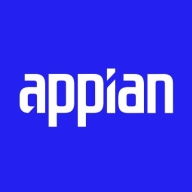

Appian and Microsoft Power Automate compete in the low-code application and automation market. Appian seems to have the upper hand in advanced process modeling and case management, while Power Automate excels in affordability and ease of use within the Microsoft ecosystem.
Features: Appian stands out with low-code development, robust process modeling, and seamless integration, enabling rapid application development. It offers comprehensive case management features and supports a flexible deployment model. Microsoft Power Automate is notable for its integration capabilities within Microsoft's ecosystem, affordability, and ease of use for automating tasks using multiple connectors for services like Office 365 and SharePoint.
Room for Improvement: Appian users call for improvements in UI customization, error handling, and mobile functionality. The platform's complex environment presents challenges for less technical users. Microsoft Power Automate faces challenges with advanced RPA functionality, a complex licensing model, and limited AI capabilities. Users desire more non-Microsoft integrations and improved error handling.
Ease of Deployment and Customer Service: Both platforms offer various deployment options, including public and hybrid cloud solutions. Appian is commended for its excellent customer service, with quick response times and effective problem resolution. Microsoft Power Automate benefits from Microsoft's extensive ecosystem, offering user-friendly solutions and prompt support for simpler issues, though complex problems may take longer to resolve.
Pricing and ROI: Appian's high cost reflects its enterprise-level capabilities, driving significant ROI through reduced process times. Microsoft Power Automate is more budget-friendly, especially for organizations already using Microsoft products, providing a cost-effective approach with lower entry barriers and value in Microsoft 365 packages.
They see return on investment in terms of cost savings, time savings, more efficient processes, and more efficient employees.
Appian is very efficient, allowing us to build a lot of applications within a financial year, making it cost-effective.
On a daily basis, it saves about two to three hours.
It has helped us save time, and we've saved thousands of hours through automation.
There has been around 20% to 30% productivity improvement, which will definitely save money and costs.
Their customer service is responsive, and the team is very prompt for support.
The technical support for Appian rates as 10 out of 10 because they have a great support team.
The technical support is generally good.
Having experience with coding is essential to fully utilize Power Automate.
On a scale of one to ten, the technical support of Microsoft Power Automate rates as three within India, and eight or nine for support from outside India.
They offer 24-hour technical support that consistently answers inquiries.
On a scale of one to 10, Appian rates as a nine for scalability.
Initially, without much coding, I can easily handle five thousand records.
Appian is scalable, but it depends on how you build your applications.
Microsoft Power Automate is scalable enough for me and my customers.
It depends on how it has been designed and how it has been configured.
The stability of Appian would rate as nine, as it's a stable environment.
It has room to improve for use cases where the users are public facing, where anonymous users could come to a site and run a business workflow or interact with some data.
If there is a very complex process that includes a lot of data transitioning and memory-centric processes, it consumes a lot of memory.
I would like to see more enhancement in the user interface to allow more freedom in designing the sites and pages.
Developers should have discretion over which view they want to use, either the old designer view or the new designer view, as Microsoft is forcing the new designer view, which most developers don't prefer.
It would be better to make it a wizard more than requiring coding.
We haven't gone into depth to explore the integration with AI, so I am not really sure.
On the pricier side, both Appian and Pega are enterprise-level solutions, placing them on the slightly higher side.
The pricing of Appian is based on the number of users and generally ranges from 70 to 100 USD per user per month.
The price of Appian, on a competitive landscape, is a little bit on the higher side for companies, rating maybe a 6.5.
The price of Microsoft Power Automate was affordable for our clients, who are small companies.
I don't remember paying anything excessively or overpriced.
Microsoft Power Automate is reasonably priced compared to others in the market.
The zero-code integration feature is remarkable, allowing for ease of data transfer and workflow enhancement.
Appian is aiding in leveraging AI technologies in multiple ways: one way is for developers, as they make development efficient and quick by enabling developer co-pilots across various phases of the application, which helps design Appian quickly and provides suggestions along the way.
It is easy for me to define the process and create configurable workflows.
We have saved thousands of hours by automating tasks that would have been labor-intensive and error-prone if done manually.
If I want to fill something in Power Platform and need to fill another item in Salesforce, instead of doing the same task in different platforms, I can directly fill it in Power Platform and integrate it with Salesforce through API in Microsoft Power Automate, and my work is complete.
Microsoft Power Automate has positively impacted my organization as it has saved a lot of time and effort.
| Product | Market Share (%) |
|---|---|
| Microsoft Power Automate | 19.9% |
| Appian | 5.5% |
| Other | 74.6% |


| Company Size | Count |
|---|---|
| Small Business | 20 |
| Midsize Enterprise | 9 |
| Large Enterprise | 41 |
| Company Size | Count |
|---|---|
| Small Business | 50 |
| Midsize Enterprise | 17 |
| Large Enterprise | 65 |
Appian is a unified low-code platform and solution used by businesses to build enterprise applications and workflows. This product adapts to the needs of clients and the technologies they are already using to combine their data in a single workflow and maximize resources. The platform has four main components through which it transforms the work process for companies of various sizes. They are:
Appian is utilized across a diverse set of industries, including automotive and manufacturing, energy and utilities, education, financial services, telecom and media, transportation, retail, insurance, healthcare, and life sciences. The most frequent use cases of Appian are customer journey, governance, risk and compliance, operational efficiency, supply chain, distributed order management, and environmental, social, and governance (ESG) management.
Appian Features
Appian has various features that allow users to create solutions for their businesses. These features can be separated into a few groups according to function, including automation, low-code application development, and integrations and data. Some of the most frequently used features of Appian include:
Appian Benefits
The benefits of using Appian include:
Reviews from Real Users
A practice leader - digital process automation at a computer software company values Appian highly because the product is easy to develop, low-code, and has a good user interface.
Alan G., an advisory board member at Codecon VR, Appian offers a clear application life cycle, easy to learn documentation, and comes with a fundamentals course.
Microsoft Power Automate is a powerful tool that streamlines and automates tasks within an organization.
It is used for workflow automation, data integration, and creating automated notifications and approvals.
Power Automate connects different applications and services, such as SharePoint, Excel, and Outlook, to automate data transfer and synchronization.
We monitor all Process Mining reviews to prevent fraudulent reviews and keep review quality high. We do not post reviews by company employees or direct competitors. We validate each review for authenticity via cross-reference with LinkedIn, and personal follow-up with the reviewer when necessary.